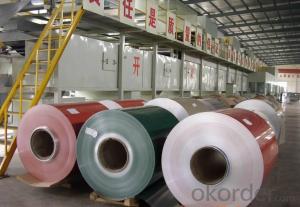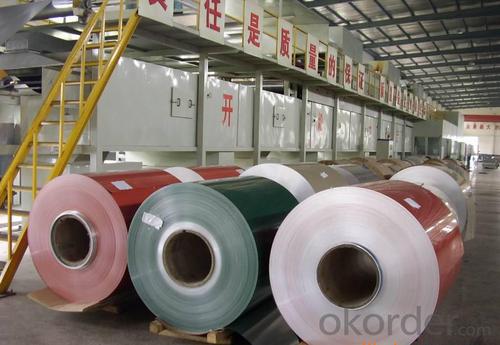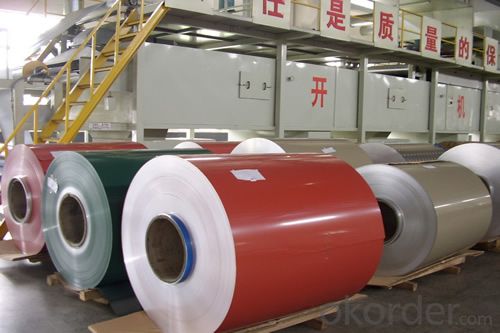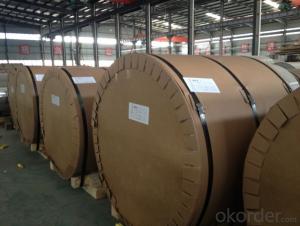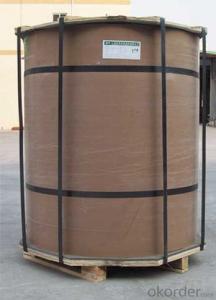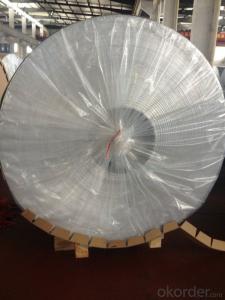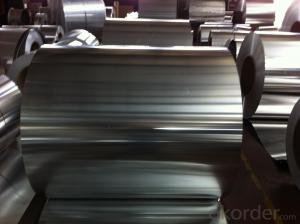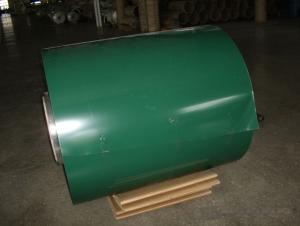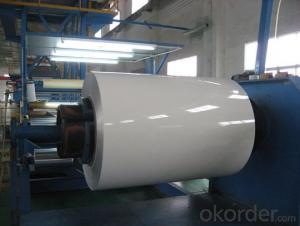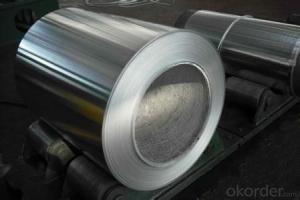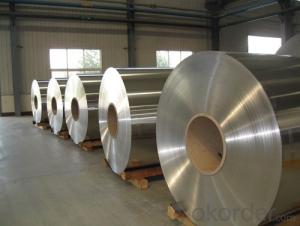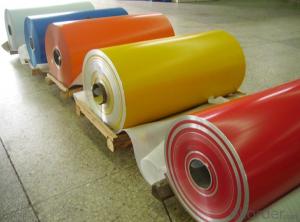Aluminum Coil Saufit Alloy 1100 PVDF Aluminum Roll for Roofing/Ceiling/Gutter/Decoration
- Loading Port:
- Tianjin
- Payment Terms:
- TT OR LC
- Min Order Qty:
- 5 m.t.
- Supply Capability:
- 50000 m.t./month
OKorder Service Pledge
OKorder Financial Service
You Might Also Like
Specification
Alloy 1100 PVDF Aluminium Roll for Roofing/Ceiling/Gutter/Decoration
Specification
Grade
| 1000 Series: 1050 1060 1070 1100 1200 1235 etc. 3000 Series: 3003 3004 3005 3104 3105 3A21 etc. 5000 Series: 5005 5052 5083 5086 5154 5182 5251 5754 etc. 6000 Series: 6061 6063 6082 6A02 etc. 8000 Series: 8006 8011 8079 etc. |
Thickness | 0.05~10mm |
Width | <1600mm< span=""> |
Color | Metallic, Solid, RAL or by customer requirements |
Coating paint: | PVDF(Polyvinylidene Fluoride), PE(Polyester ) |
Coating thickness | as per customer’s request |
Gloss | 10-90%(EN ISO-2813:1994) |
Total coating thick | Polyester18~25micron(EN ISO-2360:1995) PVDF25 ~35micron(EN ISO-2360:1995) |
Coating hardness | 2H |
Protective film | PVC film, Colorless transparent or White-black |
Adhesion | 5B (EN ISO-2409:1994) |
Impact resistance | No cracking and peeling (A.S.T.M D2794-1993) |
Flexibility (T-bend) | 0T- 2T |
Temper | H16, H18, H24, H26, H26 |
Certification | ISO9001:2000, CE, SGS |
Coil's standard diameter | 1100mm |
Inner Diameter | 405mm/505mm |
Coil's standard weight | 2000kgs |
Payment | L/C ,T/T |
Packing
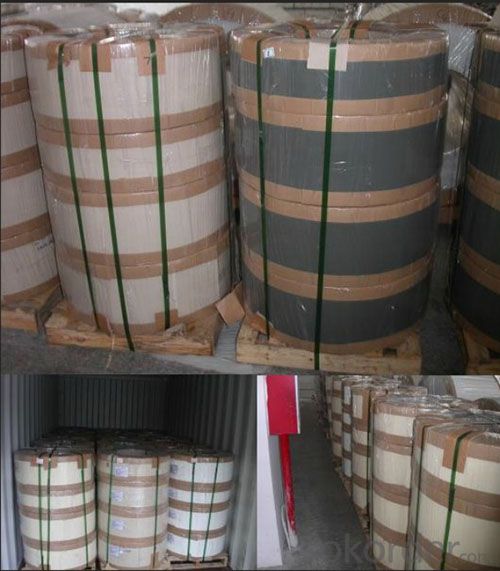
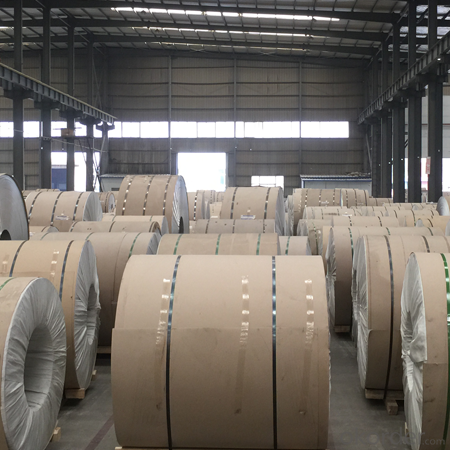
FAQ
Q: How can I request a product sample? A: The samples are free but freight should be collected. Please send sample list and courier account number by email.
Q: How can I request a product catalog? A: The hard copies of catalogs are free but freight should be collected. Please send courier account number by email. You are suggested to request a PDF catalog.
Q: Wha's your payment terms? A: One is T/T 30% before production and 70% against copy of B/L; the other is Irrevocable L/C 100% at sight.
Q: What's your trade terms? A: FOB, CNF(CFR), CIF, EXW.
Q: How long is the quality guarantee? A: All of our products have a period of quality guarantee since time of shipment. Please contact your salesman for more details, as different products enjoy different time of guarantee
- Q: Is anodized aluminum suitable for indefinite salt-water exposure or will it rust? Also note that it would be used for the hull of a boat (more like a platform), and if it is not suitable could you suggest another metal?
- Is Aluminium Rust Proof
- Q: Are there any environmental benefits to using aluminum coils?
- Using aluminum coils offers several environmental benefits. First and foremost, aluminum is a highly sustainable material that can be recycled without losing its original properties. This reduces the need for mining and extracting new raw materials, thereby decreasing the environmental impact of these processes. Additionally, recycling aluminum requires only a fraction of the energy needed to produce primary aluminum, resulting in substantial energy savings and reduced greenhouse gas emissions. In addition, aluminum coils have a longer lifespan compared to other commonly used materials like copper or steel. This means that fewer coils need to be manufactured and replaced over time, leading to reduced waste generation and a lower overall environmental impact. Furthermore, aluminum is corrosion-resistant, eliminating the need for potentially harmful treatments or coatings. This reduces the release of hazardous substances into the environment during the manufacturing and use of aluminum coils. Lastly, aluminum's lightweight nature contributes to lower transportation costs and energy consumption during distribution. This results in decreased fuel consumption and associated emissions, ultimately reducing the carbon footprint of using aluminum coils. Taking all these factors into consideration, the use of aluminum coils provides significant environmental benefits, including reduced resource extraction, energy conservation, waste reduction, and lower emissions.
- Q: What are the best rust-proof coils? Please tell me the model and manufacturer in Shangdong. Thank you.
- 3003 aluminum coil, AL-Mn series alloy, is the most widely used rust-proof aluminum with the density being 2.73. It is applicable to insulation projects such as pipe insulation, packaging, machine parts, refrigerator, air conditioning and ventilation pipes and other wet environment.
- Q: Can aluminum coils be used in the production of electronic components?
- Indeed, electronic components can utilize aluminum coils in their production. Aluminum, a highly versatile and extensively employed metal across diverse industries, including electronics, harbors numerous benefits. Notably, it possesses a lightweight nature, exceptional thermal conductivity, resistance to corrosion, and superb electrical conductivity. These remarkable properties render aluminum coils fitting for deployment in electronic components, encompassing capacitors, transformers, inductors, and heat sinks. By incorporating aluminum coils in electronic components, the dissipation of heat becomes more efficient, performance is enhanced, and the overall weight of electronic devices is reduced.
- Q: This question asks about the suitability of aluminum coils for outdoor applications based on their weight and strength.
- <p>Yes, aluminum coils are lightweight and strong, making them suitable for outdoor use. Aluminum is known for its high strength-to-weight ratio, which means it can withstand significant stress without adding much weight. It also has excellent corrosion resistance, which is crucial for outdoor applications where exposure to weather elements can lead to degradation. Additionally, aluminum's malleability allows it to be easily shaped and formed into various configurations for different outdoor structures and applications. Its light weight also reduces the load on structures, which can be an advantage in many construction scenarios.</p>
- Q: Are aluminum coils suitable for air conditioning systems?
- Yes, aluminum coils are suitable for air conditioning systems. Aluminum coils offer excellent heat transfer properties, durability, and resistance to corrosion, making them a popular choice in air conditioning systems. They are lightweight, efficient, and can withstand high-pressure applications, making them a reliable option for cooling and refrigeration purposes.
- Q: I would like to order 25 micron diameter 99.99% Aluminum wire required to use for making electrical connections. Only several cm are needed, so I would like to purchase a small spool. Delivery ASAP preferable (overnight or two day shipping would be best). This wire will be attached by hand using epoxy and not using a wire bonder.
- If they can't help, try asking the tech support guys at the wirebond manufacturers and the tool manufacturers. KS in the US and Shinkawa in Japan used to be the big guys. You can search for ultrasonic bond tools. You can also check with superconducting research centers; several private and public ones. Researchers might loan you materials and/or bonding support. BTW, Al critical temp is reportedly about 1.2°K, pretty tough to get that cold! U/S bond wire has 1% silicon, partly for hardness, you can probably bond pure wire though. Key is breaking up the oxide. Maybe bonding at cold temps and/or in vacuum would work. Also, I doubt epoxy would be good or superconducting at the temps. Al filled epoxy is unreliable electrical conductor due to oxide formation. Will be a bear to handle such fine wires without a bonder! Good luck!
- Q: What are the different alloys used in aluminum coils?
- Aluminum coils are made using various alloys, each possessing unique properties and applications. Some commonly employed alloys include: 1. 3003: Renowned for its exceptional formability and resistance to corrosion, this alloy finds frequent use in applications requiring moderate strength, such as automotive components, storage tanks, and kitchen utensils. 2. 5052: An alloy characterized by its versatility, good corrosion resistance, high fatigue strength, and excellent weldability. It is commonly utilized in the production of aircraft fuel tanks, marine components, and architectural applications. 3. 6061: Distinguished by its high strength and excellent machinability, 6061 is often employed in structural components like frames and braces. It also offers good corrosion resistance, making it a popular choice in the aerospace and automotive industries. 4. 8011: Primarily used in the packaging industry, particularly for manufacturing aluminum foil. This alloy provides good formability, high tensile strength, and excellent resistance to moisture and chemicals. 5. 1100: A commercially pure aluminum alloy, prized for its high electrical and thermal conductivity. It is commonly utilized in electrical wiring, heat exchangers, and lighting fixtures. These examples represent only a fraction of the alloys available for aluminum coils, as there are numerous other variations tailored to specific requirements and applications. The choice of alloy depends on several factors, such as desired strength, corrosion resistance, formability, and cost considerations.
- Q: Are aluminum coils suitable for architectural louvers?
- Yes, aluminum coils are suitable for architectural louvers due to their lightweight nature, durability, and corrosion resistance. They can be easily shaped and formed into various louver designs, providing both functionality and aesthetic appeal to architectural structures.
- Q: How do aluminum coils compare to zinc coils in terms of durability?
- Aluminum coils and zinc coils have different properties that impact their durability. Generally, aluminum coils are known for their excellent corrosion resistance, making them highly durable in various environments. They have a natural oxide layer that forms on their surface, providing a protective barrier against rust and other forms of degradation. This makes aluminum coils ideal for applications in coastal areas or places with high humidity levels. On the other hand, zinc coils, specifically galvanized steel coils, are coated with a layer of zinc to enhance their resistance to corrosion. This zinc coating acts as a sacrificial layer, meaning that it corrodes first, protecting the underlying steel from rust. Therefore, zinc coils are also durable and can withstand harsh conditions, particularly in applications where the steel substrate is exposed to moisture or chemicals. While both aluminum and zinc coils offer good durability, aluminum coils have an edge in terms of resistance to corrosion. Their natural oxide layer provides ongoing protection, whereas zinc coils rely on the sacrificial zinc coating, which can eventually wear off over time. However, the durability of both types of coils ultimately depends on factors such as maintenance, usage, and the specific environment in which they are installed.
Send your message to us
Aluminum Coil Saufit Alloy 1100 PVDF Aluminum Roll for Roofing/Ceiling/Gutter/Decoration
- Loading Port:
- Tianjin
- Payment Terms:
- TT OR LC
- Min Order Qty:
- 5 m.t.
- Supply Capability:
- 50000 m.t./month
OKorder Service Pledge
OKorder Financial Service
Similar products
Hot products
Hot Searches
Related keywords
